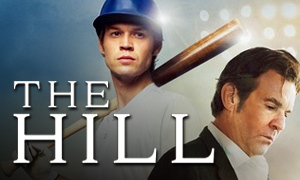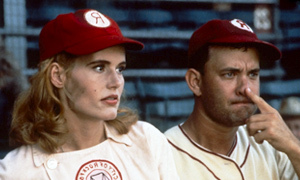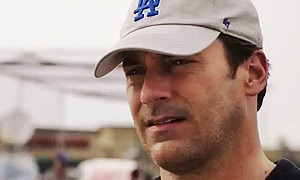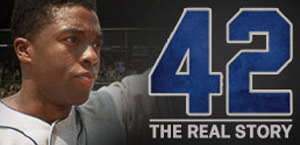42: History vs. Hollywood
based on Jackie Robinson and his signing with the Brooklyn Dodgers
| REEL FACE: | REAL FACE: |
Chadwick Boseman
Born: November 29, 1976 Birthplace: Anderson, South Carolina, USA | Jackie Roosevelt Robinson
Born: January 31, 1919 Birthplace: Cairo, Georgia, USA Death: October 24, 1972, Stamford, Connecticut, USA (heart attack) |
Harrison Ford
Born: July 13, 1942 Birthplace: Chicago, Illinois, USA | Branch Rickey
Born: December 20, 1881 Birthplace: Stockdale, Pike County, Ohio, USA Death: December 9, 1965, Columbia, Missouri, USA (heart attack complications) |
Nicole Beharie
Born: January 3, 1985 Birthplace: West Palm Beach, Florida, USA | Rachel Robinson
Born: July 19, 1922 Birthplace: Los Angeles, California, USA |
Andre Holland
Born: December 28, 1982 Birthplace: Bessemer, Alabama, USA | Wendell Smith
Born: March 23, 1914 Birthplace: Detroit, Michigan, USA Death: November 26, 1972, Chicago, Illinois, USA (cancer) |
Christopher Meloni
Born: April 2, 1961 Birthplace: Washington, District of Columbia, USA | Leo Durocher
Born: July 27, 1905 Birthplace: West Springfield, Massachusetts, USA Death: October 7, 1991, Palm Springs, California, USA (natural causes) |
Lucas Black
Born: November 29, 1982 Birthplace: Speake, Alabama, USA | Harold Peter Henry "Pee Wee" Reese
Born: July 23, 1918 Birthplace: Ekron, Kentucky, USA Death: August 14, 1999, Louisville, Kentucky, USA |
Alan Tudyk
Born: March 16, 1971 Birthplace: El Paso, Texas, USA | Ben Chapman
Born: December 25, 1908 Birthplace: Nashville, Tennessee, USA Death: July 7, 1993, Hoover, Alabama, USA (heart attack) |
John C. McGinley
Born: August 3, 1959 Birthplace: New York City, New York, USA | Red Barber
Born: February 17, 1908 Birthplace: Columbus, Mississippi, USA Death: October 22, 1992, Tallahassee, Florida, USA (pneumonia and kidney complications) |
Had the real Jackie Robinson been arrested and court-martialed in the army?
Yes. The 42 true story reveals that Robinson had been arrested and court-martialed during boot camp for refusing to go to the back of a segregated bus, as explained in the movie. However, he was subsequently acquitted of the charges and was given an honorable discharge. -JackieRobinson.org
What does Jackie's widow, Rachel Robinson, think of the 42 movie?

Jackie Robinson marries Rachel Isum on February 10, 1946 and would have 3 children. They met at UCLA in 1941.
"As soon as I sat down and watched it, I was relieved. And excited," says Rachel, referring to the movie in general and her uncertainty with how the filmmakers would approach that period of history. -NYDailyNews.com
Did a reporter really help Jackie when he was brought into the Dodgers organization?
Yes. Wendell Smith, portrayed by Andre Holland in the 42 movie, was a sportswriter for the Pittsburgh Courier, a popular African-American newspaper in the 1930s and '40s. Smith was responsible for recommending Jackie Robinson to Brooklyn Dodgers General Manager Branch Rickey. Not only did he subsequently act as Robinson's traveling companion (sometimes out of necessity since they both often had to stay in segregated hotels), Smith was also the ghostwriter of Jackie Robinson's weekly 1947 newspaper column. In addition to Robinson, Wendell Smith recommended other standouts from the Negro leagues, including Larry Doby, Monte Irvin and Roy Campanella. -ChicagoTribune.com
To learn more about Wendell Smith, watch our episode 42: History vs. Hollywood below. To follow our latest episodes, subscribe to our YouTube channel.
Why was the reporter so determined to help Jackie?
The true story behind the 42 movie reveals that Wendell Smith's motivations for helping Jackie Robinson didn't just come from the fact that he wanted to some day be able to sit in the press box instead of the bleachers. The real Wendell Smith had firsthand experience with segregation in baseball. He played as a teenager in the 1930s and once threw a shutout in an American Legion game. After the game, a scout who had been in attendance told Smith that he wished that he could sign him but he couldn't. Instead, the scout signed the opposing pitcher. "That's when I decided that if I ever got into a position to do anything, I'd dedicate my life to getting Negro players into the big leagues," Smith said. -Post-Gazette.com
Did Jackie really toss a baseball to a young Ed Charles, who would later become a Major League Baseball player?

As a boy, the real Ed Charles (right) never got a ball from Robinson, but he did put his ear to the train tracks.
As the movie states at the end, Ed Charles did grow up to win the World Series as part of the "Miracle Mets" team of 1969.
Did some of the players really start a petition against Jackie Robinson?
Yes. During training camp, teammate Dixie Walker instigated a petition against Jackie Robinson. Though it was supported by some of the players, others like Pee Wee Reese refused to sign it. "It didn't matter to me whether he was black or green," Reese later said, "he had a right to be there, too." -NYTimes.com
Was Jackie Robinson hit in the head with a wild pitch from the Pittsburgh Pirates Fritz Ostermueller?
In examining the 42 movie true story, we discovered that Pirates pitcher Fritz Ostermueller hit Jackie in the elbow during that 1947 game, not the head. The only reason the pitch didn't hit him in the head was that Jackie lifted his arm to shield his face. Former Pirate Jim Russell later said that Ostermueller had been ordered to take Robinson down. Overall, Jackie was hit by nine pitches during his rookie season. -Pittsburgh Post-Gazette
Did the real Jackie Robinson smash his bat in private after enduring racial insults from manager Ben Chapman and the Phillies team?
No. In researching the true story, it quickly became clear that this scene never took place in real life. Although Phillies manager Ben Chapman's racial slurs are definitely based in fact, Robinson never fell apart in a tunnel behind the Dodgers dugout, smashing his bat against a wall and breaking it into pieces. Thus, he was never subsequently consoled by Dodgers General Manager Branch Rickey, who happens to be standing nearby in the movie. Actor Chadwick Boseman tried to justify this scene by saying, "At some point he had to break, and the fact that Rachel Robinson didn't fight us to take (the scene) out (of the film), to me proves that it is true." -Reuters.com
Was Phillies manager Ben Chapman really asked to pose with Jackie Robinson for a photo op?

Robinson and Ben Chapman are asked to pose together after Chapman's racial slurs caught the attention of the press.
Years later, Dodgers general manager Branch Rickey commented, "Chapman did more than anybody to unite the Dodgers. When he poured out that string of unconscionable abuse, he solidified and unified thirty men, not one of whom was willing to sit by and see someone kick around a man who had his hands tied behind his back—Chapman made Jackie a real member of the Dodgers." -Jackie Robinson Autobiography
Did baserunner Enos Slaughter really spike Robinson in the leg when crossing first base?
Yes. Whether Enos Slaughter intentionally spiked Jackie Robinson has been the subject of controversy over the years. Slaughter was known for his aggressive and at times dirty style of play, also spiking Giant infielder Bill Rigney that same year and injuring a number of other players on various occasions. With regard to whether his stepping on Robinson was racially motivated, Enos Slaughter responded, "I've never in my life spoke against a black player. I was accused of spiking Jackie Robinson, but I stepped on a lot of players." -NYTimes.com

Top: Pee Wee Reese and Robinson share a moment on the field in the 42 movie. Bottom: The real life friends pose for a photo.Did Pee Wee Reese really put his arm around Jackie Robinson on the field?

Top: Pee Wee Reese and Robinson share a moment on the field in the 42 movie. Bottom: The real life friends pose for a photo.
Yes. However, there is no photograph of this moment and whether Reese put his arm around him, his hand on his shoulder, or simply stood beside Robinson is unclear. The one thing that is clear is that Pee Wee Reese saw his friend and fellow player being taunted, and he came over to stand by his side. "I remember Jackie talking about Pee Wee's gesture the day it happened," Rachel Robinson recalled in 2005. "It came as such a relief to him, that a teammate and the captain of the team would go out of his way in such a public fashion to express friendship." A statue commemorating this act of kindness was unveiled in 2005 in front of KeySpan Park, a Brooklyn ball field. -NYTimes.com
Jackie Robinson Biopic and Related 42 Videos
Explore the 42 true story by watching the full 1950 movie The Jackie Robinson Story in which he plays himself. Also, view interviews, a short biography and the 42 movie trailer.
WATCH 1950 The Jackie Robinson Story (Jackie Robinson, Ruby Dee, Minor Watson)Starring Jackie Robinson as himself, watch
the original Jackie Robinson biopic that
tells the story of how the baseball legend
became the first African-American Major
League Baseball player of the modern era.
Watch the
colorized version here. Notice the
similarities with the 42 movie,
including Branch Rickey's quote, "I want a
ball player with guts enough not to fight
back." |
WATCH 42 Featurette With the Real Rachel RobinsonThis 42 featurette includes
Rachel Robinson interview segments as well
as comments from director Brian Helgeland
and the cast, including Chadwick Boseman,
Harrison Ford and Lucas Black. Famed
baseball player Hank Aaron also speaks. |
WATCH Interviews With the Real Pee Wee Reese, Jackie and Rachel RobinsonThis segment features interviews with
Jackie, his friend and fellow player Pee
Wee Reese, his wife Rachel and former
Dodger Eddie Stanky. They comment on the
discrimination Jackie endured as the first
black man to play Major League Baseball. |
WATCH Mini Bio: Jackie RobinsonA short overview of Jackie Robinson's life
is given, from his first game on April 15,
1947 that shattered the color barrier, to
winning the World Series in 1955. His
post-baseball work as a civil rights
activist is also mentioned. Footage and
images of Robinson are shown. |
WATCH 42 Movie TrailerThe 42 trailer for the Jackie
Robinson biopic starring Chadwick Boseman
as the legendary baseball player who broke
the color barrier and Harrison Ford as
Brooklyn Dodgers President and General
Manager Branch Rickey. The 42
movie trailer is also memorable for
featuring the Jay-Z song "Brooklyn Go
Hard". |
Link-to-Learn More:
- Rachel Robinson's Reaction to the 42 Movie
- Read Jackie Robinson's Autobiography
- The Jackie Robinson Foundation
- Official Warner Bros. 42 Movie Site



